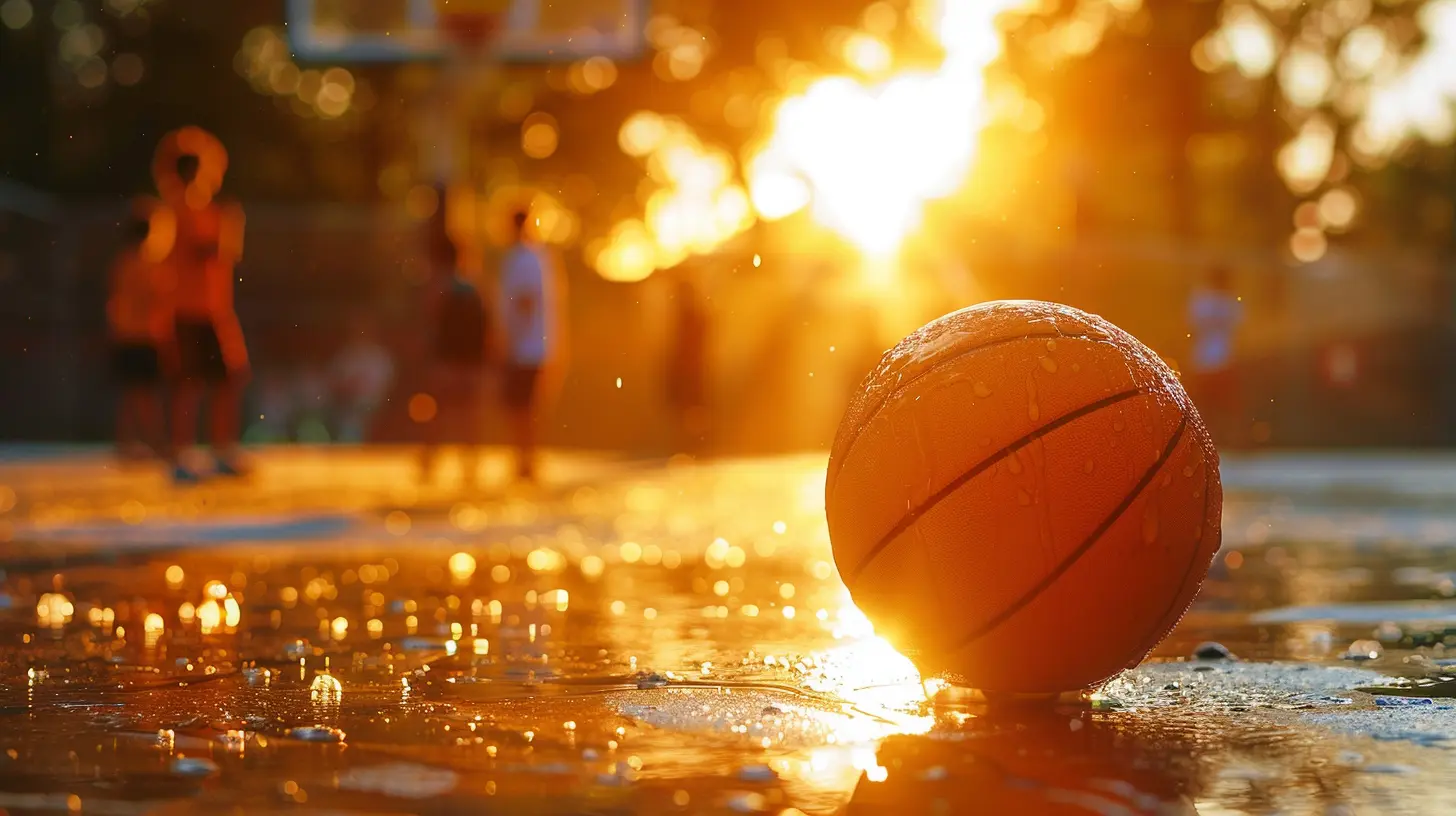The Power of Sports in Shaping After-School Routines
11 November 2025
Let’s face it—getting kids into a smooth and productive after-school routine can feel like herding cats some days. Between homework, screen time battles, and snack demands that never end, your afternoons might feel more like controlled chaos. But what if I told you there’s a secret weapon to tame that mess and bring some structure, discipline, and even joy to your child’s daily life?
Yep, I’m talking about sports. 🏀⚽🏈
Sports can do way more than just burn off that endless kid energy (though that’s a huge plus). They can actually help shape stronger after-school routines, build responsibility, and even boost academic success. So, grab that water bottle, lace up those sneakers, and let’s dive into how sports can completely transform your family’s afternoons for the better.
Why After-School Routines Matter (Spoiler: It’s Not Just About Homework)
Ever noticed how kids thrive with structure? Most of them feel safer, more grounded, and even act out less when they know what to expect. A predictable routine gives them a sense of control—which is huge in a world where most decisions are made for them.But here’s the thing: A solid after-school routine isn’t just about what kids do—it's also about how they grow in the process. Throwing sports into the mix can seriously elevate the game (pun intended 😉).
The Role of Sports in a Child’s Development
So why are sports such a game-changer (see what I did there?)?1. Teaches Time Management Like a Pro
When a kid knows they’ve got soccer practice at 4:30, guess what? They learn that homework can’t just float around until tomorrow. They start organizing their time better—and that’s a life skill they’ll carry forever.Parents often report that once their child starts regular sports practice, their procrastination drops, and they become more focused. Deadlines suddenly matter, and chores get done quicker. Maybe because they know that every minute counts before they hit the field or court.
2. Builds Responsibility and Accountability
In sports, showing up matters. Being on time, bringing the right equipment, and being mentally prepared are important. Coaches don’t baby them—they expect effort and responsibility. And when kids mess up? They learn how to bounce back (without a meltdown).That sense of accountability starts spilling over into other parts of their routine. You might find your 10-year-old packing their school bag without being asked or remembering their reading log without a reminder. Sports instill that sense of, “I’ve got to be ready.”
3. Burns Energy, Builds Focus
Let’s talk energy. Kids are like little volcanoes—one minute calm, the next minute bouncing off the walls. Sports channel that intensity into something positive.After a good session of basketball or swimming, you get a worn-out yet happy kid who’s more likely to sit down, concentrate, and finish homework without the fidgety drama. Physical activity helps with emotional regulation and focus. It's science—and parenting gold.
4. Enhances Social Skills
Being part of a team? It’s huge. Kids learn how to collaborate, handle conflict, and support each other—life lessons they don’t always get from a textbook.After-school routines that include sports become more than just scheduled time slots—they’re mini social labs. Kids develop empathy, learn to communicate under pressure, and understand the value of showing up for others.
Integrating Sports Into Your After-School Routine
Now, before you start stressing over fitting another thing into your already jam-packed schedule—breathe. Adding sports to your child’s after-school activities doesn’t mean you're signing up for Olympic-level training. It's about finding the right balance that works for your family.Start Small and Stay Consistent
Starting off with even two days a week of soccer, dance, or martial arts can create a noticeable shift in your child’s behavior and mood. It gives them something to look forward to and keeps them engaged in a purposeful activity.Consistency is the key here. You want your child to view sports not as a one-off event, but as a regular part of their routine—as natural as brushing their teeth.
Choose a Sport That Fits Their Personality
Not all kids are going to be into football or basketball. Some might thrive in individual sports like swimming, gymnastics, or track. Others may love the artistry of dance or the focus of karate.Let your child try a few different things. The goal here is to find something they enjoy so they’ll actually want to do it. If they love it, the routine almost builds itself.
Pair Sports With Other Daily Anchors
Here’s a little trick—link sports practice with other routine tasks. For example:- Homework right after practice
- Healthy post-practice snack and shower
- 30 minutes screen time only after both practice and homework
This kind of piggybacking technique turns sports into an anchor point—a natural marker in the day that helps organize everything else around it.
Real-Life Routine Examples (Because Theory is Great, But Real Life is Better)
Let’s say your child has soccer practice two weekdays a week. Here’s how you could shape an after-school routine around it:On Practice Days:
- 3:00 PM – Home from school/snack- 3:30 PM – Homework time (set a timer for focus bursts)
- 4:30 PM – Soccer practice
- 6:00 PM – Return home/dinner
- 6:30 PM – Shower and light chores
- 7:00 PM – Screen time or reading
- 8:00 PM – Bedtime routine
On Non-Practice Days:
- 3:00 PM – Home/snack- 3:30 PM – Homework
- 4:30 PM – Free play or extracurriculars (like music or art)
- 5:30 PM – Dinner
- 6:00 PM – Family time or screen time
- 7:30 PM – Bedtime prep
Notice how sports aren't the only part of the routine—it’s just a strong pillar around which other habits are built.
Mental and Emotional Wins You Might Not Expect
Physical fitness? Sure. Teamwork? Of course. But there are other behind-the-scenes benefits to adding sports into a child’s routine that are just as powerful.Boosts Confidence
Scoring a goal or nailing a routine in front of others? That’s confidence fuel.Even when they lose, the very act of trying, showing up, and improving little by little builds resilience. Kids begin to see themselves as capable, strong, and able to face challenges head-on.
Helps With Anxiety and Mood Swings
Exercise works like nature’s antidepressant. For kids dealing with school stress, friend drama, or even anxiety, sports can be a powerful form of emotional regulation.Many parents find that their kids are calmer and more even-tempered on days they’ve had practice. It’s like hitting the reset button on their attitude.
Encourages Goal-Setting
Whether it's trying to make the team or beating their personal best, sports teach kids how to work toward something. They learn that improvement comes from effort, and that success isn’t always instant—it’s earned.That kind of mindset carries over into school, relationships, and life in general.
The Role of Parents (Hint: You’re the MVP Behind the Scenes)
This might go without saying, but your support makes all the difference. When you cheer them on, organize their gear, and make sure they’re on time—you’re teaching them that commitment matters.But here’s the trick: balance. Don’t overdo it. Let them own their experience. Encourage without pressuring. Celebrate their effort, not just the wins.
And hey—don’t forget to carve out time for yourself while they’re on the field! 😉
What If Sports Aren’t Your Kid’s Thing?
Not every child is a natural athlete, and that’s okay. But “sports” can be loosely defined. Maybe they enjoy hiking, rock climbing, dance, or even yoga. The goal is to find a physical activity that excites them—not just something that looks good on a college app.You can even experiment with seasonal sports. One season of t-ball, then switch to swimming, try out fencing, or join a running club. The key is movement and commitment—those are the habits that build better routines.
Final Thoughts: Sports as the Secret Sauce to Better Afternoons
Look, parenting is messy and beautiful all at once. And trying to nail down a perfect after-school routine? That’s a moving target some days. But if you infuse your routine with the rhythm and energy of sports, you’ll notice something magical shift.Suddenly, there’s more structure. More smiles. Fewer “I’m bored” whines. Your child starts showing up not just physically but emotionally—engaged, focused, and proud of themselves.
Sports aren’t just about trophies and scoreboards—they're about shaping character, building habits, and creating daily rhythms that stick.
So, next time you see those cleats by the door or hear the whistle blow, smile. You’re not just managing chaos… you’re raising a superstar.
all images in this post were generated using AI tools
Category:
After School ActivitiesAuthor:

Tara Henson
Discussion
rate this article
1 comments
Thane Barrett
Sports aren’t just games; they’re life lessons. They teach discipline, teamwork, and resilience, shaping our kids into confident adults. Let’s not apologize for prioritizing physical activity in after-school routines—it's essential for their growth and future success. Get them moving!
November 13, 2025 at 4:56 AM

Tara Henson
Absolutely! Sports play a crucial role in developing essential life skills that contribute to a child's growth and success. Prioritizing physical activity is vital for fostering confidence and resilience.


